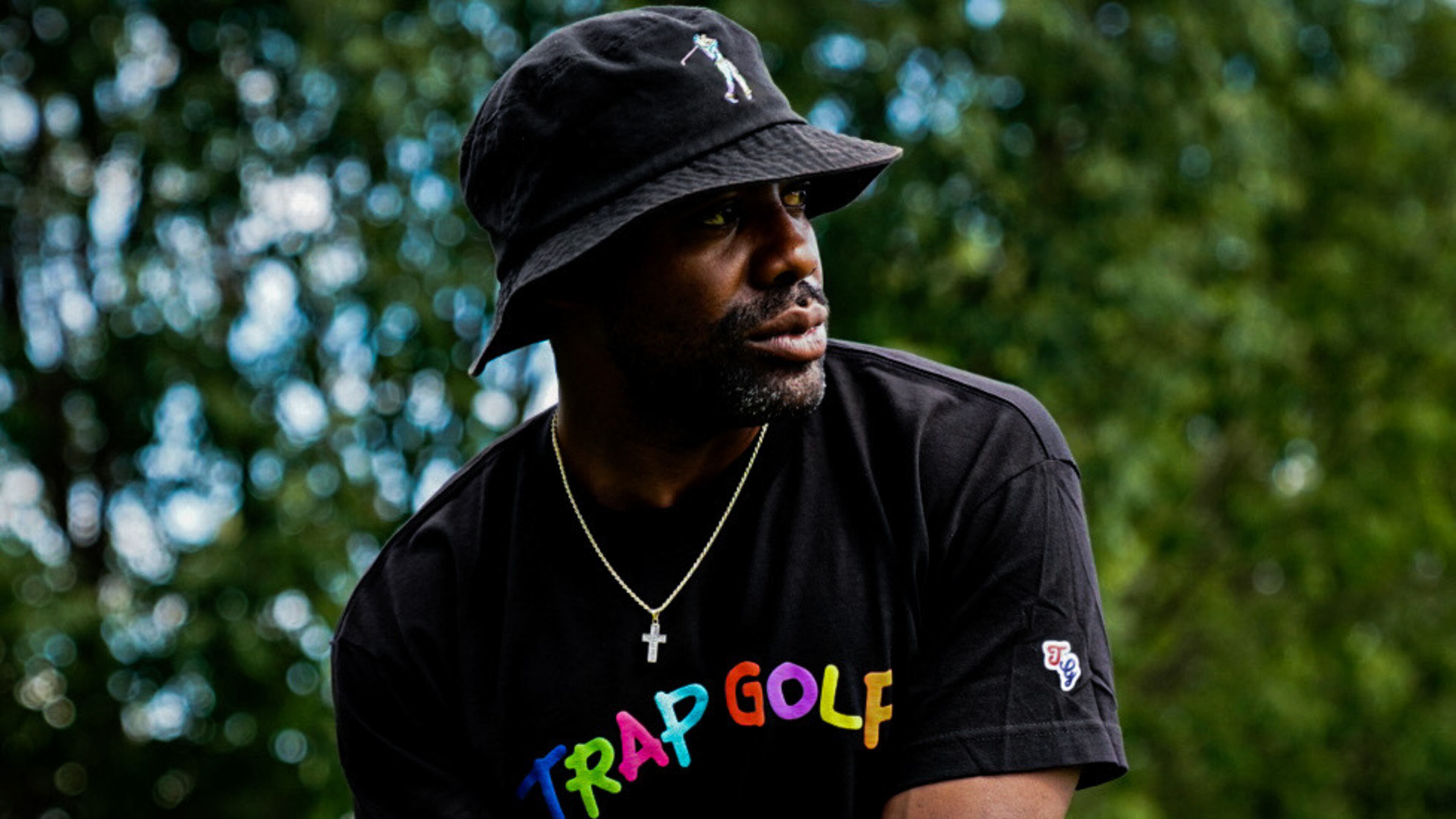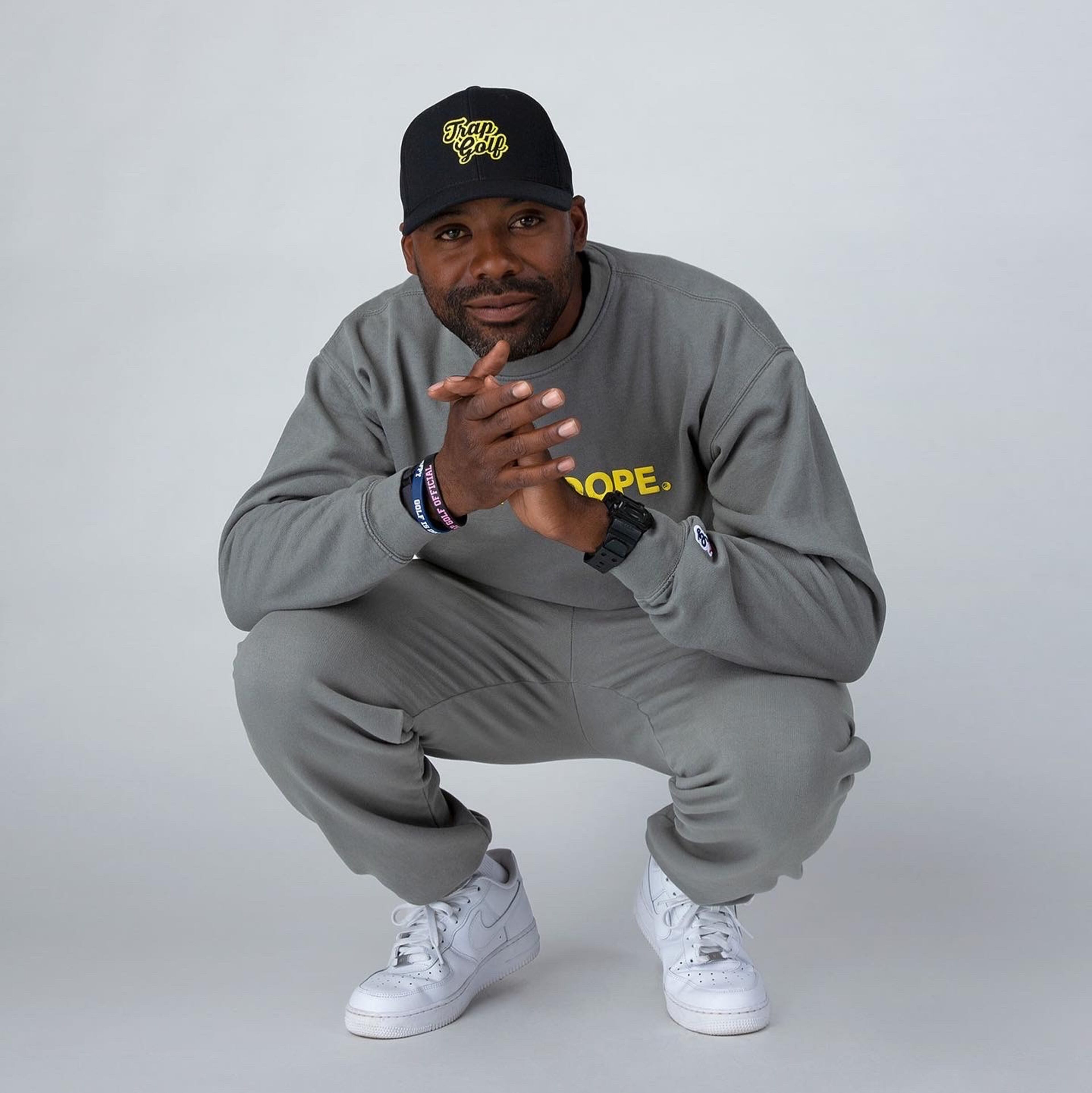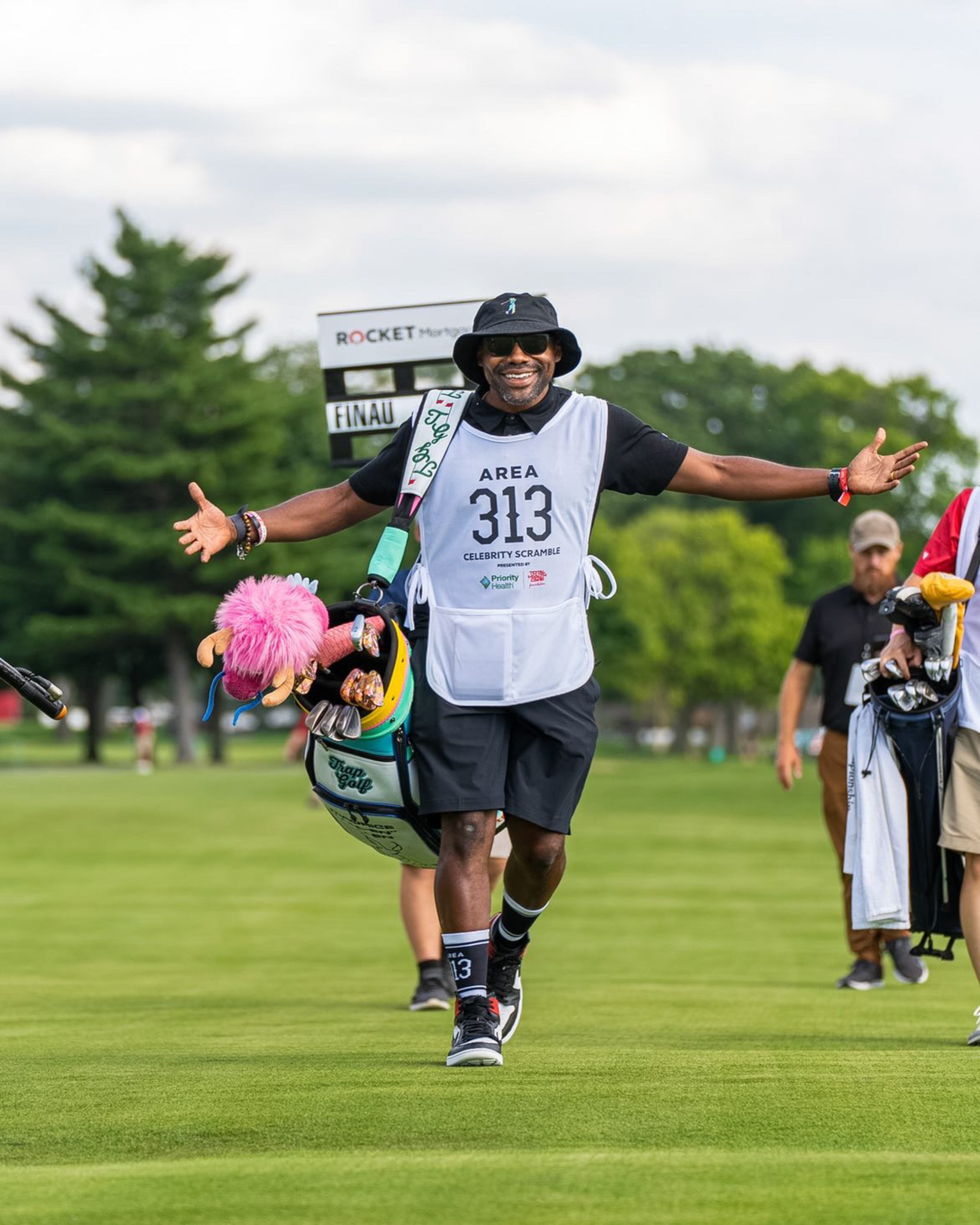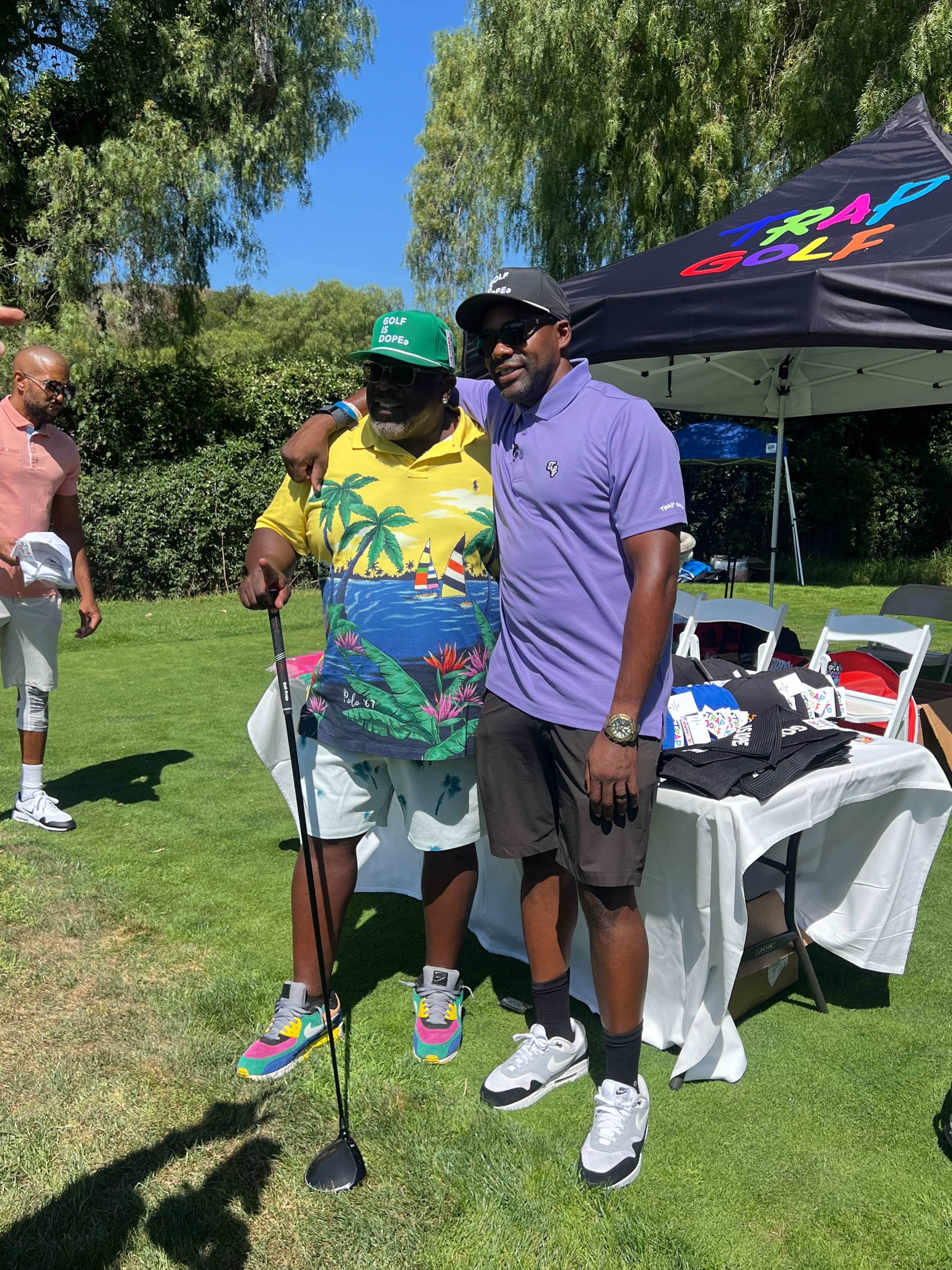How Trap Golf brings Black players to the greens

Talking to Wayne Birch Jr. is like having a conversation with your favorite Southern rapper. His drawl is steeped in life metaphors, Black Atlanta colloquialisms and braggadocio. But instead of bars and hooks, Birch is spitting game about chip shots and birdies.
For the College Park native, celebrating the commonalities between his love for golf and hip-hop culture is what drives him. With his apparel brand, Trap Golf, Birch helped launch a line of physical products that celebrates a sport predominantly played by white folks, but feels accessible to Black communities.
When Birch talks about Trap Golf’s origins, like any millennial kid who grew up in the Atlanta area, there’s always a good Migos reference to make his point.
“We made this golf stuff cool,” Birch said. “It’s a whole lot of people that come in that’s trying to ride the wave. I was like Takeoff; I was leading the wave‚” he said, referencing a track from the late rapper’s album “The Last Rocket.”
Initially launched in 2018, Trap Golf has grown into one of the sport’s most stylish up-and-coming brands. From polos and hoodies to classic caddy hats that feature slogans such as “Golf Is Dope,” “Golf, Art & Hip Hop” and boom boxes on tees, it’s not attire you’ll find in the pro shop at Augusta National.
However, as more people of color are playing golf, Birch sees these colorful designs and catchy phrases as invitations — especially for young people — to take advantage of opportunities the game provides.

Fairway hustle
Growing up, Birch’s intro to golf came from his father, a postal worker and regular at Lakeside Golf Club, a public course that closed in 2004. He respected his pop’s passion for the game, but didn’t immediately follow suit on playing until he realized there was money to be made.
Birch got a gig as a cart attendant at Lakeside, making $5.75 an hour. He witnessed a side of golf not seen on television. There, it was groups of Black men accompanied by beautiful women, talking smack, playing music and betting big money on each hole.
And they were good.
“I’m seeing these guys shell out $2,000, $3,000, $4,000 at a time, and I’m sitting there getting their golf cart,” he recalls.
He eventually got into the caddy program at the private Piedmont Driving Club, splitting his time between both jobs every Saturday and Sunday.
When Wolf Creek Golf Club opened in 2001, he jumped at the chance to work there and make $10 an hour at a predominantly Black course in South Fulton. He got to play and talk game with Atlanta Braves outfielder Ron Gant, Falcons linebacker Cornelius Bennett, Hawks star Steve Smith and other former pro athletes.
This experience went on for a few more years while Birch was a standout football player at Banneker High School. He started playing more golf at Wolf Creek and Browns Mill. Some of those ex-pro ballplayers would say, if given the chance to do it over again, they’d trade putting greens for their lingering injuries from diamonds, gridirons and the hardwood.
These guys drove nice cars, wore flashy clothes and had an undeniable aura that reminded Birch of OGs in his community.
“They play golf, they cool, they do everything that Joe do in the hood, but they ain’t going to jail,” he said.
In his senior year of high school, Birch was approached by the Wolf Creek club pro about pursuing college golf. Feeling burned out from football, he agreed to play in a few tournaments, where he caught the eye of recruiters from Southern University, a historically Black college and university in Baton Rouge, Louisiana.
At Southern, Birch was named Newcomer of the Year in the Southwestern Athletic Conference. He went on to become an All-America selection, SWAC MVP and team captain for three years. He often practiced with — and beat — players from nearby Louisiana State University, so his college coach suggested he go pro after graduation.

Who’s your caddy?
Ultimately, Birch never qualified for the PGA Tour. He later landed a job as the athletic director at Lee High School (now Liberty Magnet School) in Baton Rouge.
Pro golfer Andrew Loupe, a former standout golfer at LSU and friend, contacted Birch to gauge his interest in caddying for him. The chance to make his salary in one week was too good to pass up, so Birch agreed.
At his first tournament in 2015, Birch met Tommy Bennett, who famously caddied for Tiger Woods 20 years prior, when the latter won the 1995 Masters as an amateur. Bennett schooled Birch on the nuances of caddying and how to move in spaces where there were only a handful of Black men present.
“He kind of took me under his wing and gave me the rundown,” Birch said, adding that the veteran caddy told him to observe first, then move accordingly.
“You’ll watch and you’ll learn,” he told Birch as they walked the course at TPC River Highlands in Connecticut.
A few years later, in 2018, Birch was caddying for Troy Merritt. The pair enjoyed success in the form of two top-10 finishes and a win at the Barbasol Championship. Despite the success, the lack of representation for Black caddies, officials and PGA Tour staff at tournaments was noticeable.
“When I was out there for my first two years, I was the only Black caddy, so dealing with that every week, I always used to struggle when we’d go to places in the South,” Birch said.
Part of Birch’s routine when traveling was to jog in nearby neighborhoods. When he stayed at an Airbnb in Brunswick for the RSM Classic at Sea Island, he remembers the eerie feeling of running in the vicinity of where Ahmaud Arbery was murdered.
Shortly after Arbery’s death in February 2020, golf and the world were put on pause during the COVID-19 pandemic. Birch was forced out of work for a few months, but his caddying experiences served as a muse for a new hustle.

‘Trap this golf’
As a caddy, Birch landed hat deals with big brands, including Valspar, Wilson and Titleist. At the time, he connected with Aaron Munn, a military kid who spent time in Atlanta, New York City and Tokyo. Like Birch, Munn was also an educator, who coached high school golf. Munn is also a huge hip-hop head who was making designs for Trap Golf and launched the website, but he needed a face for the brand.
Enter Birch, who gravitated toward Munn’s aesthetic and wanted to cut his hat deals with the big boys and rep Trap Golf. In 2020, the two started texting and agreed to have Birch wear all Trap Golf everything when the PGA Tour picked back up.
The pair knew golf, hip-hop culture and how to connect with younger generations. “Me being a teacher, Munn being a teacher, we have a rapport with youth that normal people won’t have. We see what’s coming before y’all see it coming,” Birch said.
Birch and Munn knew they could use music from Migos, Jeezy, T.I. and 2 Chainz to engage newer, younger audiences with the game.
“They all want to be trappers, but if they use that same mentality in golf, it’s going to take them places,” Birch said, adding that their hope is for the brand to expose young folks to positions beyond just playing, including engineering golf balls, courses and designing apparel.
Like the old heads, ex-ballplayers and men who got him into the game, Birch wants Trap Golf to connect in the same way. If trapping is simply just another way to describe hustling, why not show kids the places they can go by applying a hustler’s spirit to the sport?
“It’s so many different jobs in golf that Black kids don’t even know about. If we could trap this golf, get their attention, it’d be like, ‘Oh man, I like this,” he said.
Birch started wearing Trap Golf at PGA Tour events, but it was his appearance at the 2021 Travelers Championship that blew it up. Birch joined golfer and friend Sam Burns on the course, as Harrison English beat Kramer Hickok in a sudden death, eight-hole playoff. Every time the camera panned over to Burns, next to him was Birch, wearing his Trap Golf gear. They hit more than 250 online sales in that one day.
Next, there were shout-outs from celebrities such as Cedric the Entertainer, in addition to big-name customers Steph Curry, ScHoolboy Q, Rick Ross, Rory McIlroy, Mookie Betts and others.
The brand is now featured in retail shops at airports in Memphis, Tennessee; Jacksonville and West Palm Beach, Florida; Scottsdale, Arizona; and Detroit. The brand is also a fixture at the John Shippen National Invitational, which showcases Black talent and is named after the game’s first Black pro.

Locally, Trap Golf is available at the College Park Golf Course, and has been sold for the past three years in the Tour Championship shop at East Lake Golf Club. Birch also would like to see Trap Golf take up residence at Hartsfield-Jackson Atlanta International Airport. He wants to see some of his favorite trap artists invest in the brand.
Beyond the course, Trap Golf’s founders have worked to bring visibility to young players of color. A portion of proceeds from their sales go to the Atlanta-based Excel Youth Academy, a mobile program offering junior golf lessons and STEAM — science, technology, engineering, arts and math — activities.
It’s not lost on Birch that through Trap Golf, he can offer opportunities that weren’t available in his youth.
“In Atlanta, I could tell you it was only like 10 Black kids that played golf when I came up,” he said. “I’m proud that I’m from College Park, somewhere that you don’t play golf, and I made it out by playing golf.”
Become a member of UATL for more stories like this in our free newsletter and other membership benefits. Follow UATL on Facebook, on X, TikTok and Instagram.
